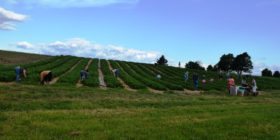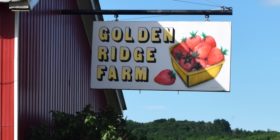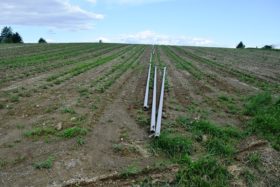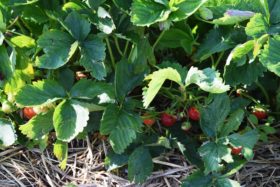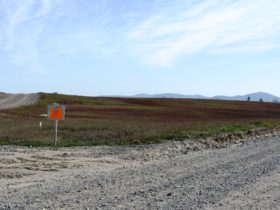Berries
Strawberries
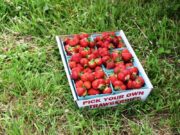 Strawberries are a high value crop in Maine agriculture with net profit potential of $6,000 or more per acre. The number of farms raising strawberries and the acreage dedicated to them increased substantially in recent years, with more demand for locally grown fresh fruit. Strawberries are the most widely grown small fruit crop in Maine. Nearly all the fruit is sold fresh through “pick-your-own” opportunities, such as this one in Sherman, though some are offered at farmers markets.
Strawberries are a high value crop in Maine agriculture with net profit potential of $6,000 or more per acre. The number of farms raising strawberries and the acreage dedicated to them increased substantially in recent years, with more demand for locally grown fresh fruit. Strawberries are the most widely grown small fruit crop in Maine. Nearly all the fruit is sold fresh through “pick-your-own” opportunities, such as this one in Sherman, though some are offered at farmers markets.
Most are June-bearing varieties, grown in fields that are not harvested until the year after planting, for a period of about four weeks during June and July. Plants are set out in the spring with about 18 inches between them and about four feet between rows. In the planting year flowers are removed and the plants mulched in mid-November to provide winter protection.
Strawberries are a unique and valuable crop because of the “pick-your-own” market that brings people to the farm to see and talk with those for whom farming is a livelihood.
Raw strawberries are low-calorie fruits. One cup has 45 calories and provides 100% of the recommended vitamin C for an adult. They are also rich in potassium. Only by adding sugar or high-fat products—like a pie crust or whipped topping—will you add calories and fat.
Wild Blueberries
Maine’s 44,000 acres of wild blueberries grow naturally in fields and barrens that stretch along the Downeast coast to the state’s southwest corner. Adapted to Maine’s naturally acid, low fertility soils and challenging winters, wild blueberries need minimal management. After the August harvest, the plants are pruned to the ground by mowing or burning.
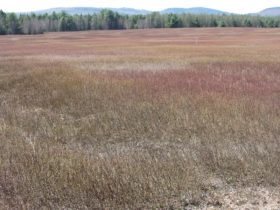
Silsby Plain Glacial Remnant and Blueberry Barrens in Aurora (2013) @
Native Americans were the first to use the tiny blue berries, both fresh and dried, for their flavor, nutrition and healing qualities. In the 1840’s wild blueberries were first harvested commercially.
The berries are naturally resistant to many native pests, but are still vulnerable to disease, drought, insect damage and winter injury. Wild bees, however, are critical for pollinating the blueberry crop. Wild blueberries make a major contribution to Maine’s economy. In 2007 the overall impact totaled $250 million. A growing demand for fresh and processed wild blueberries in the U.S. and abroad suggests a bright future for the industry.
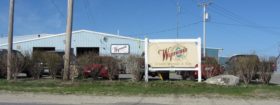
Wyman’s Blueberry Facility in Deblois near Route 193 (2013) @
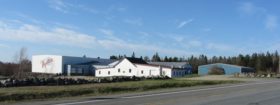
Wyman’s Blueberry Facility in Wesley on Route 9 (2013) @
Most blueberry enterprises (82%) are in “Downeast” Maine in the counties of Washington (37%), Hancock (23%), Knox (14%) and Waldo (8%). According to a 2015 survey of growers, 14% reported managing over 100 acres, 34% managed 26 to 100 acres, and 52% managed less that 26 acres.
Additional resources
Handley, David. “Maine Integrated Pest Management (IPM) Programs – Strawberry Integrated Pest Management.” University of Maine Cooperative Extension. Monmouth, Me. https://extension.umaine.edu/ipm/programs/stawberry-ipm
Conroy, Jane. “Vegetables and Fruits for Health: Strawberries.” University of Maine. Cooperative Extension. Bulletin #4268. https://extension.umaine.edu/publications/4268e/
“SUMMARY REPORT 2015 MAINE WILD BLUEBERRY GROWER SURVEY.” https://extension.umaine.edu/blueberries/wp-content/uploads/sites/56/2016/07/2015-WBB-Grower-Survey_Maine-Summary-Report.pdf [Of the 325 eligible participants, 161 low bush blueberry growers returned a completed survey, for a 49.5% response rate.]
Yarborough, David. “Maine Wild Blueberries” https://extension.umaine.edu/blueberries/


